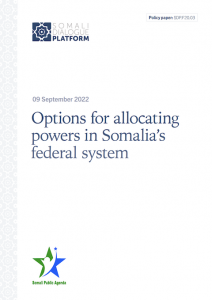Somalia formally adopted a federal system in 2004 with the establishment of the Transitional Federal Government. This model became more established in 2012 with the ratification of the Provisional Federal Constitution (PFC), which clarified many critical areas of Somalia’s governance dispensation. In principle, the introduction of federalism was intended to dis-incentivize conflict, as it was felt re-distributing power and resources away from Mogadishu would mean parties to the conflict would be less inclined to compete for control over the capital. The notion of federalism has arguably enabled more cooperative relations among Somalis, laying the basis for interactions between central government in Mogadishu and existing autonomous units, such as Puntland. Since 2012, following ratification of the PFC, it has also enabled the formation of other Federal Member States (FMS), providing a framework for how they relate to central government.
Despite this, many aspects of Somalia’s federal model remain undefined, particularly the allocation of powers between different levels of government. This goes to the heart of the federal model, as it defines the extent to which power is actually re-distributed from the centre. There remains almost no agreement amongst Somalis on this issue, however, with the PFC providing only [a few] contradictory guidelines on power allocation.
The absence of agreement on the distribution of powers has contributed to conflict and tension between different levels of government, especially the FGS and FMS. In October 2017, for example, disputes over Somalia’s foreign relations – on which the PFC is ambiguous – fed into emerging conflict when five FMS established the Council of Inter-State Cooperation, before going on to suspend relations with the FGS the following year. Other areas of tension related to power allocation centre around the distribution of international aid and the role of the FGS and FMS in education. Such tensions have contributed to wider struggles between the FGS and FMS. Reaching clarity on the allocation of powers in Somalia’s federal model is, therefore, a critical priority when it comes to advancing the country’s post-conflict trajectory. To achieve this, meaningful and inclusive political dialogue on the allocation of powers is essential. As such, this paper outlines a framework for analysing the issue, as well as the available options for starting a dialogue on relevant political processes. This product is part of a series of options papers dealing with related critical weaknesses and ambiguities within Somalia’s political settlement. Of particular relevance here are the Platform papers on fiscal federalism and the security architecture. These products have been developed in consultation with a range of technical experts and political influencers as part of the Platform’s ‘F20’ initiative, which collaboratively explores solutions to contentious issues in Somalia’s political settlement. The paper is intended as a tool for Somali policymakers and the wider public in the upcoming political cycle, allowing them to re-engage in productive dialogue on the issue.




